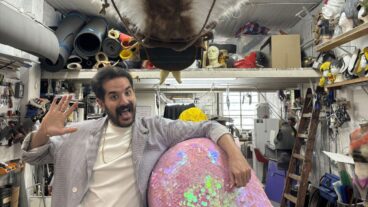Israeli filmmaker Dan Katzir: We live in an age that has lost its innocence. When filmmaker Dan Katzir saw the classic Yiddish play Grine Felder (Green Fields) in New York about three years ago, he cried when the curtain fell. It was a reaction not expected from a young sabra and former lieutenant in the paratroopers, especially since he hardly knew a word of Yiddish.
“The play was funny and sad, it was naive and, above all, innocent,” said Katzir, sitting in a French cafe near the campus of the University of California in Los Angeles. “We live in an age that has lost its innocence.”
Katzir is passionate about innocence, a word and concept barely mentioned in polite conversation these days. Sounding almost like a Victorian moralist, he regrets the pervasive cynicism and violence he sees and hears all around him.
“Our popular culture is cynical, the music and rappers we hear are angry and cynical, even the comic books the kids read are cynical,” he said. “In Israel, it’s even more extreme, it’s a whole view of life. When you read Sholem Aleichem or Chekhov, they can be sharp, but their love of humanity shines through. They are forgiving of human foibles. Where do you find that kind of sensibility now?”
Transmuting his outlook and experience into his work, Katzir has just completed a documentary on New York’s Yiddish theater, which he captured on film just as the final curtain came down on Grine Felder and its venerable actors, after a sparsely attended one-week run.
Katzir is 34 (sensitive to Hollywood’s obsession with youth, he admits his age reluctantly) and absorbed his abhorrence of violence and inhumanity early on in his native Tel Aviv. When he was three, his grandfather, the eminent scientist Aharon Katzir (Katchalsky) was gunned down by Japanese terrorists in a 1972 mass murder at Lod Airport.
A second trauma was the assassination of Yitzhak Rabin, which served as the background to his first acclaimed documentary, Out for Love, Be Back Shortly. The intimate story of the shy director’s romance with his girlfriend, juxtaposed against the country’s struggle with terrorism and death, spoke to the dilemma of Israel’s young generation and continues to be shown in high schools and army camps.
This year, Katzir has been on a roll. In the last couple of months, his film Today You Are a Fountain Pen, a story about an American bar mitzva boy who learns the meaning of becoming a man from his Holocaust survivor grandfather, has won top awards at three U.S. film festivals.
Since his documentaries are rooted in Jewish tradition and in Israel, why does Katzir, a graduate of the Tel Aviv University film school and more recently of the prestigious American Film Institute in Los Angeles, work in America?
“I was once told by a Yiddish playwright that if you want to talk about the shtetl you have to travel and look at it from the outside,” Katzir said after a thoughtful pause. “In the future, I want to make movies both in Israel and abroad to tell Israelis about the Jewish world outside and the outside world about Israel. I want to make films that convey a message of love and hope and which reach as large an audience as possible.”
Katzir is not happy about Israeli films shown in the US.
“When people talk about an Iranian film or a French film, they have a certain style and attitude in mind,” he said. “In the Israeli film industry, movies seem to be made at random, with no clear idea what they’re aiming for. Many come across as mean and violent.”
His favorites are Italian movies, such as Cinema Paradiso and Life Is Beautiful, which, even if the themes are dark, give a sense of hope and, yes, innocence. “Many Israeli directors are parochial and, for one, have no idea how to make movies that appeal to an American Jewish audience,” he said. “Yet, there is a tremendous warmth and humanity in Israeli life that isn’t being shown on the screen. There are any number of possible Israeli versions of My Big, Fat Greek Wedding that could well compete on the international market.”
But Katzir, whose film Company Jasmine tracked the toughest combat course for women IDF officers, bristles at any suggestion that he is anti-Israeli. “I am a very proud Israeli,” he said. “I served in the army for four-and-a-half years. If I criticize my people, it is out of love.”
His life in Israel wasn’t bad at all. He comes from a prominent family. Among them are his grandfather’s brother, Ephraim Katzir, who served as Israel’s president, his father Abraham, a university professor, and his mother Yael, a historian, author, and film producer. Thanks to Out of Love, people recognized Dan on the street and admired him.
And life in Hollywood isn’t such a piece of cake. “You have to start from the beginning and prove yourself all over again,” he said. “I am older than the thousands of hopefuls who flock here. I have an accent. I have no family here and I don’t know that many people. When I tell people that I served in the Israeli army, they look at me as if I had just come out of prison.”
Yet Katzir is determined to convey his message through film, whatever the obstacles. On the side, he is now finishing a book about his army experiences, when he served as a raw recruit and later as an officer in the West Bank during the first intifada.
The experience, he said, completed his education about “how low human beings on both sides can sink.” Yet the title he has chosen for the book is Love Is Always the Answer.
(Originally appeared in The Jerusalem Post)












